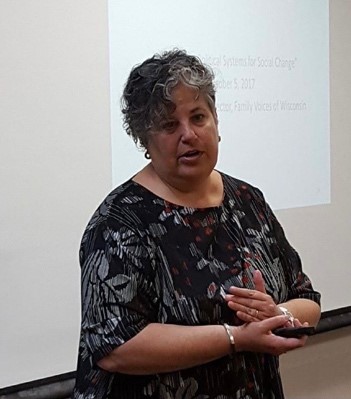Resources on Medicaid work requirements
The National Disability Navigator Resource Collaborative (NDNRC) has compiled a bank of news and resources relating to Medicaid work-requirement waivers: Summary of Posts and Resources on Medicaid Work Requirements.
A blog post from the Georgetown Center on Children and Families (CCF) – A Disturbing Trend of Hiding the Coverage Losses is Emerging in Medicaid Waivers (7/17/18) – addresses the lack of information on budget neutrality in state waiver applications, which may be helpful for advocates commenting on their state’s waiver proposals. Waivers are supposed to be budget-neutral.
Kentucky Waiver – Open for Public Comment Again
As reported in the July 3 Washington Update (under “Courts”), a federal court vacated the Department of Health and Human Services (HHS) approval of a Kentucky Medicaid waiver proposal to impose work requirements on Medicaid beneficiaries. The court’s ruling was based on the failure of the Centers for Medicare and Medicaid Services (CMS) to consider the evidence provided in numerous public comments that the waiver would lead to loss of coverage. The court included excerpts from organizations’ comments as an appendix to its opinion, demonstrating the importance of public comments in establishing a record that must be considered by the agency in making waiver decisions.
On July 18 CMS announced that it would provide another 30-day public comment period for the Kentucky waiver. The comment period ends on August 18. Rather than following the usual process for submitting comments through Regulations.gov, CMS is taking comments through Medicaid.gov.
Mississippi Waiver – Open for Public Comment Again
Mississippi has also requested a waiver to establish work or community engagement requirements for Medicaid beneficiaries. Under that proposal, those who are employed the required number of hours and get paid minimum wage will then make too much to qualify for Medicaid. (Those who meet non-paying community engagement requirements would still be eligible.) In light of an amendment to the waiver proposal, CMS is providing another comment period for the Mississippi proposal as well. Comments are due on August 18.
Other States’ waivers and waiver proposals – comments
The Kentucky court ruling does not affect the status of other states’ waivers or waiver applications, and the administration has let it be known that it still plans to promote work requirements for Medicaid beneficiaries. See Trump Administration to Push Forward on Medicaid Work Requirements after Court Loss (The Hill, 7/26/18); Red States May Be Ready to Expand Medicaid — In Exchange for Work (Pew blog, Stateline, 7/30/18).
In addition to Kentucky, Arkansas, Indiana, and New Hampshire have been granted waivers to establish Medicaid work requirements, although Arkansas is the only state to have implemented them as yet. See One Month into Medicaid Work Requirement in Arkansas, Warning Lights are Already Flashing (Say Ahhh!, blog of the Georgetown Center on Children and Families, 7/20/18).
Waiver proposals from several other states are also open for public comment: Rhode Island’s Global Waiver Renewal (due August 17); Maine’s Demonstration for Individuals with HIV/AIDS (due August 18); Maryland’s Health Choice (due August 18); Utah’s Primary Care Network (due August 11); Delaware’ Diamond State Health Plan SUD Amendment (due August 12); and Delaware’s Diamond State Health Plan Extension (due August 12).
New: State-Level Comment Periods
Several states are currently taking comments on their waiver proposals to establish Medicaid work requirements. Alabama is providing a second comment period.
- Healthy Michigan– comments are due August 12.
- Alabama Medicaid Workforce Initiative– comments are due August 30. (See second paragraph of Public Notice for submission details.)
- Oklahoma Soonercare– comments are due September 3.


















